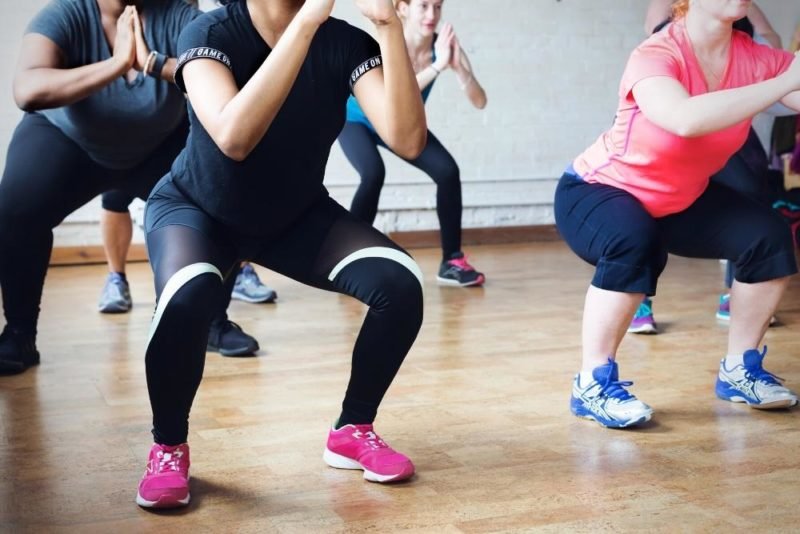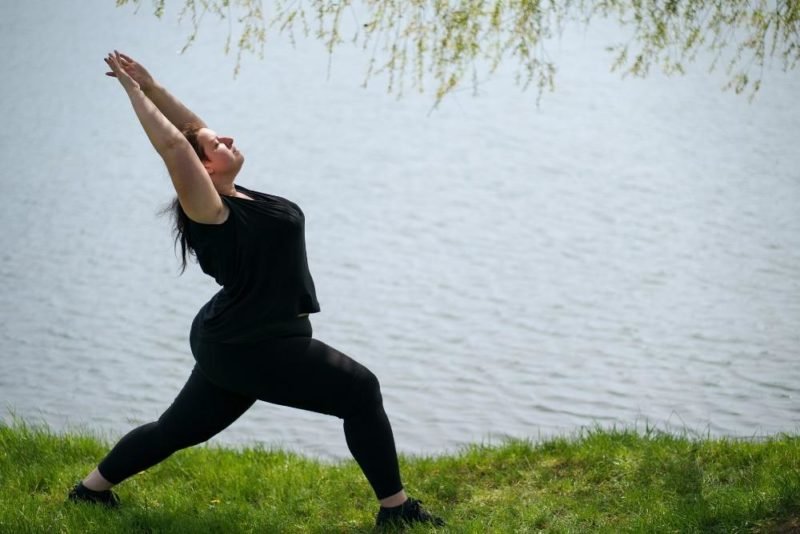
One of the unfortunate side effects of living in a dieting, weight-centric culture is that much of the perceived value of nutrition and exercise gets wrapped up in the question, “Will this help me lose weight?”
Our bodies are very complex, and while positive inputs (nutritious food, regular movement, adequate sleep, self-care) have countless benefits for health and well-being, there’s no guarantee they will lead to weight loss.
Several years ago, I had a patient who came to see me after completing a 6-week bootcamp-style exercise program. She told me that when the program was over, she stopped exercising because “I didn’t lose any weight.” That made me sad, because we have so much to gain when we move our bodies often in ways that we enjoy.

A persistent mythology
The notion that bumping up our physical activity will lead to weight loss – or that a society-wide decrease in activity has cause the “obesity epidemic” – has been debunked in scientific circles. That hasn’t stopped it from being perpetuated in the media, and I’m not just talking about “blast your belly fat” type headlines on women’s magazines.
An excellent example of this happened about a year ago in The New York Times. Gretchen Reynolds, who writes primarily about fitness, wrote about a small randomized controlled trial in which the 52 participants were randomly assigned to either exercise six times per week, two times per week, or not at all for 12 weeks. The researchers found that there were no significant differences in the amount of weight lost or gained between the three groups.
Note: in scientific parlance, “significant” difference means a difference that can’t be chalked up to chance (thanks, grad school biostatistics classes). Thus, a (statistically) significant difference could be very small or very large.
But you wouldn’t KNOW that there were no significant differences based on the NYT headline (“To Lose Weight With Exercise, Aim for 300 Minutes a Week”) or, to be fair, the title of the research study (“Exercise for Weight Loss: Further Evaluating Energy Compensation with Exercise”).
This is unfortunately a not-infrequent problem with research studies. In far too many cases:
- The abstract (the summary at the beginning of the published research paper) overstates the actual findings.
- This misinformation is then picked up, and sometimes even amplified further, in the press release put out by the university or other organization at which the research was conducted.
- Those press releases are then picked up by the media, and there are far, far fewer reporters and writers who are trained in how to read and understand research…
- …that is, if the reporters even have access to the full research paper, since many research journals are behind paywalls and subscriptions are expensive, generally hundreds of dollars per year.

Calories out, calories in
Research shows that, on average, physical activity results in little-to-no weight loss. That research also shows that there are “outliers,” individuals who do lose weight when they exercise more. What we’re now starting to understand is that this difference may be based on genetics.
Evidence from clinical trials demonstrates pretty consistently that our energy (calorie) intake rises to match our energy expenditure, making weight loss from increased exercise difficult, if not impossible, for most people. This “energy matching” typically happens over weeks, not days, and we’re not even aware it’s happening.
Among people who are trying to lose weight, food and physical are often coupled in a way they shouldn’t be. This may lead people to eat more because they exercised more. I vividly remember walking around Greenlake in Seattle years ago and listening to two women talk about how they could go get scones because they “earned them” by walking around the lake. (On the flip side, many people don’t eat enough food to fuel their physical activity, then wonder why they keep hitting a wall.)
This coupling of food and exercise also makes many dieters push themselves to exercise more because they ate something they “shouldn’t,” turning movement into a punishment.
I think one of the best things anyone can do is permanently uncouple food and movement. They are each their own thing, and contribute to health and well-being (or lack thereof) in their own ways. Research is clear that engaging in physical activity regularly (at least 150 minutes of moderate activity per week) helps reduce our risk of cardiovascular disease, for example, and weight-bearing exercise helps keeps our bones strong as we age.

Alignment with life values
No matter how busy I am, I aim to fit in some movement every day. If I get off track for some reason, I get back on track as soon as I can. Why? It’s simple:
- I want to be strong.
- I want to have endurance.
- I want to be flexible.
- I want to have good balance.
All these benefits of staying active tie into my values. I don’t value lifting weights for the amount of weight I can lift…I value that maintaining my muscle mass allows me to engage in activities of daily living with relative ease and will help me age well. Plus, some of the movements I do help improve balance. This all supports of my larger life values – independence – which includes physical independence.
I don’t value walking fast for the sake of walking fast…I value that I have the endurance to do a lot of walking when I travel, because that’s my preferred way to sightsee. I also know that being able to walk briskly is associated with aging well. This ties into my values of independence and learning (because I see travel as a type of education).
I value how yoga makes me feel when I’m on the yoga mat and after. (Value: self-kindness), (When I’ve gone a week or more with no yoga, I feel the difference.) Twisting poses help keep the spine healthy (the spine is a major area where women lose bone mass with age) and many other poses help with balance. (Value: independence) I also use yoga as a moving mindfulness practice, tuning in to how the movements feel.
When a habit aligns with your deeper values, it’s a habit that’s more likely to stick. What do you value? How might this fit in with moving your body in ways that feel uniquely right for you?
Disclaimer: All information provided here is of a general nature and is furnished only for educational purposes. This information is not to be taken as medical or other health advice pertaining to an individual’s specific health or medical condition. You agree that the use of this information is at your own risk.
Hi, I’m Carrie Dennett, MPH, RDN, a weight-inclusive registered dietitian, nutrition therapist and body image counselor. I offer compassionate, individualized care for adults of all ages, shapes, sizes and genders who want to break free from eating disorders, disordered eating or chronic dieting. If you need to learn how to manage IBS symptoms with food, or improve your nutrition and lifestyle habits to help manage a current health concern or simply support your overall health and well-being, I help people with that, too.
Need 1-on-1 help for your nutrition, eating, or body image concerns? Schedule a free 20-minute Discovery Call to talk about how I can help you and explore if we’re a good fit! I’m in-network with Regence BCBS, FirstChoice Health and Providence Health Plan, and can bill Blue Cross and/or Blue Shield insurances in many states. If I don’t take your insurance, I can help you seek reimbursement on your own. To learn more, explore my insurance and services areas page.
 Print This Post
Print This Post






